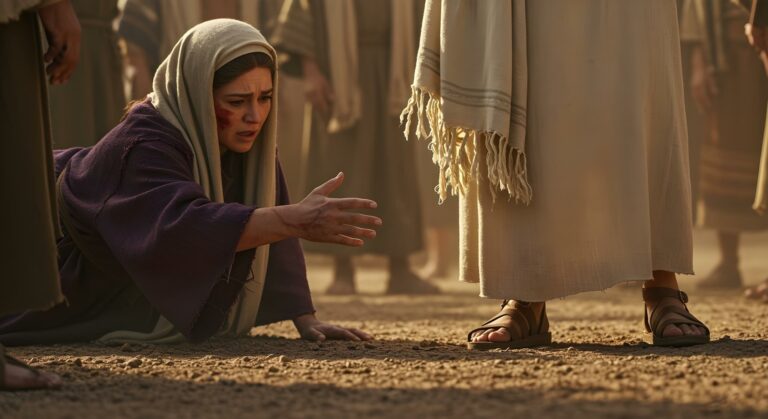Imagine working outside trimming the bushes in your front yard on a hot sunny day. After much trimming you enter your house so you can get an ice cold glass of water. You enter the kitchen where you find the cookie jar shattered on the floor with the cookies scattered everywhere. You call your six-year-old son to come into the kitchen.
You ask him: Did you knock over the cookie jar?
Your son looks down and mutters: Yes, I thought I could get a cookie without dropping the cookie jar.
Here’s an interesting question: Why would you believe him? Maybe because he has nothing to gain by telling the truth and everything to gain by telling a lie.
This is one of many ways historians use to verify whether a historical document is speaking truth on a particular subject or is truthful as a whole. Historians refer to this as the principle of embarrassment. This principle assumes that any details embarrassing to the author or embarrassing to their goal in writing a document are probably true. Why is that? It’s because the tendency of most people is to leave out anything that makes them look bad or make their cause look bad. What do the gospels look like in light of this revelation?
The gospel writers include embarrassing details about themselves and the other disciples:
They are dim-witted: Mark 9:32; Luke 18:34; John 12:16
They are uncaring: They fall asleep on Jesus twice when he asks them to pray for him in his time of need (Mark 14:32-41). Moreover, they don’t even have the courage to give their rabbi a proper burial and instead it was a member of the Sanhedrin (Joseph of Arimathea) who is in the very court that sentenced him to death.
They are rebuked: Peter is called Satan by Jesus (Mark 8:33). Can you imagine Mark saying to Peter: Hey Pete! I’m going to have the Lord call you Satan, what do you think about that? Peter would rightly say back, Have him call you Satan, why do I got to be called Satan! This is certainly not something you would make up off the top of your head.
They are cowards: All of the disciples abandoned Jesus (except one) when he was crucified. Peter denies him three times after saying to Jesus’ face he would never disown him (Matthew 26:33-35). While the male disciples were hiding for fear of the Jews, the brave female disciples stood by Jesus at the cross, during his burial, and visited the tomb on Sunday morning.
They are doubters: Despite being taught several times that Jesus would rise from the dead, they still doubted after being told by the women that he resurrected. Thomas doubted until he saw Jesus for himself and some even doubted after he was risen (Matthew 28:17).
The gospel writers included embarrassing details about Jesus:
Jesus:
- is considered out of his mind by his family (Mark 3)
- is thought to be a deceiver (John 7:5)
- is deserted by many of his followers (John 6:66)
- turns off Jews who had believed in him to the point that they want to stone him (John 8:30-31, 59).
- is called a drunkard (Matthew 11:19)
- is called demon-possessed (Mark 3:22; John 7:20; 8:48)
- is called a madman (John 10:20)
- has his feet wiped with the hair of a prostitute (an event that had the potential to be perceived as a sexual advance – Luke 7:36-39)
- is crucified by the Jews and Romans despite the fact that anyone who is hung on a tree is under God’s curse (Deuteronomy 21:23; Galatians 3:13)
The gospel writers include difficult sayings of Jesus:
Jesus:
- declares “the Father is greater than I” (John 14:28)
- says no one, including himself, knows the time of his second coming (Matthew 24:36)
- is seen cursing a fig tree for not having figs even though it was not the season for figs to be on the tree (Matthew 21:18)
- seems unable to do many miracles in his hometown (Mark 6:5)
- makes a morbid claim about how eating the Son of Man’s flesh and drinking his blood will give you eternal life (John 6:53)
While there are reasonable explanations for these sayings and others 1, it doesn’t make much sense that the gospel writers would complicate things by leaving these statements (and many others) in there.
The gospel writers left in many demanding sayings of Jesus:
- Jesus speaks about just having sexual thoughts about someone is equal to committing adultery against your spouse (Matthew 5:28)
- Jesus talks about not divorcing your spouse unless it’s because of sexual infidelity. (Matthew 5:32)
- Jesus talks about when someone strikes you on the cheek, turn the other cheek to him. And if someone wants to sue you and take your tunic, let him have your cloak as well. If someone forces you to go one mile, go with him two miles. Give to the one who asks you, and do not turn away from the one who wants to borrow from you. (Matthew 5:39-41)
- I tell you: Love your enemies and pray for those who persecute you… (Matthew 5:44-45)
I’ve only highlighted some of the many embarrassing moments in the gospels.2 It would appear that there is a lot of embarrassing material in the gospels and so that should tell us that the gospel writers are habitually truth tellers and that we should give them the benefit of the doubt when talking on subjects we aren’t able to verify. This is one of many reasons why the gospels are considered to be eyewitness testimony.
- When trying to understand alleged contradictions or errors, books like The Big Book of Bible Difficulties: Clear and Concise Answers from Genesis to Revelation (formerly known as When Critics Ask) by Norman Geisler and Thomas Howe and the New International Encyclopedia of Bible Difficulties by Gleason Archer. ↵
- A lot of the content from this post was taken from the book, I Don’t Have Enough Faith to be An Atheist by Frank Turek and Norman Geisler (Wheaton: Crossway, 2004). ↵



